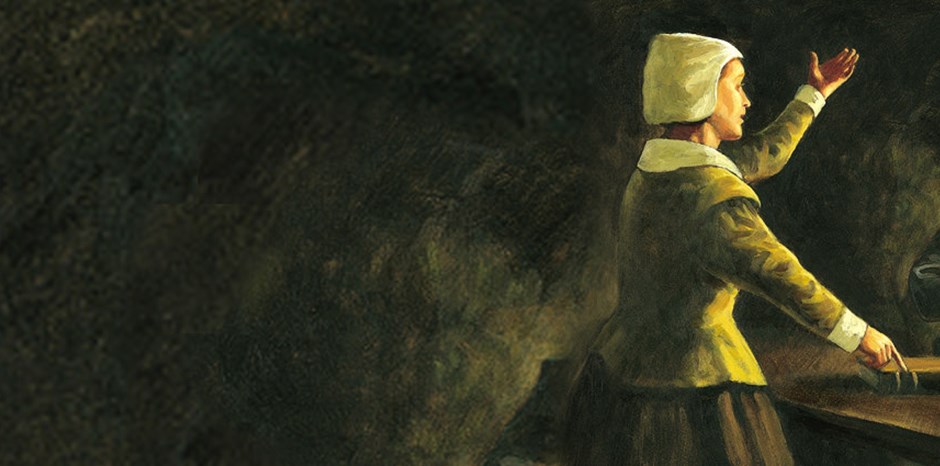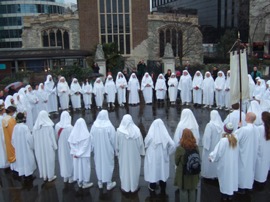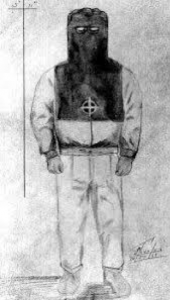For centuries women have fought against numerous injustices forced upon them because of their gender. Some of these injustices include the right to be seen as an equal to men, the right to vote, and the right for equal pay, along with many more. Although women have succeeded in breaking down some of these barriers, there are still many inequalities being fought today. During the seventeenth century, there was one woman in particular who battled in opposition to social injustice: Anne Hutchinson. This article is about the life of a brave woman who opposed an unfair law forbidding men and women from freely practicing their religion, and who also challenged the preposterous roles women were limited to in the religious community.

Anne Hutchinson, maiden name Anne Marbury, was born July 20, 1591, in Alford, England. She was the daughter of a midwife and a Cambridge scholar who published many unorthodox religious texts. In fact, Francis Marbury’s teachings were banned from where he was a teacher, at Saint Wilfred’s School in Alford. After vigorous pleading, Marbury was able to have the ban lifted, and he began teaching again in 1602. 1 Perhaps this is where Anne inherited her tenacious spirit to express her opinion. In 1605, at the young age of fourteen, Anne and her family moved to London for her father’s new position as rector of Saint Martin’s Vintry, leaving behind Anne’s boyfriend, a tailor named William Hutchinson. After the death of Anne’s father in 1611, Hutchinson moved to London to be with Anne; the next year the two were married. That same year, the newlywed bride returned to Alford where her husband continued his tailor business, and Anne followed in her mother’s footsteps as a midwife. Anne and William went on to raise thirteen children together in Alford. 2
In 1612, newly ordained Puritan minister John Cotton began preaching at Saint Botolph’s Church in Boston, Lincolnshire, not far from Alford where Anne Hutchinson resided. His unique approach greatly intrigued Hutchinson. 3 Cotton’s preaching and his understandings of religion reminded Anne of her father’s teachings. Anne enjoyed Cotton’s work so much, that in 1633, when Cotton immigrated to New England, Anne convinced her husband to move there as well. In 1634, Anne and her family made the long transition to Massachusetts. 4
The following year, in 1635, Hutchinson began holding weekly gatherings in her home to discuss minister Cotton’s sermons. Anne and her followers addressed their beliefs of sheer grace as opposed to the Calvinist theological viewpoint of predestination. Hutchinson and her followers believed that God alone grants salvation to whomever He believes is worthy of His grace, without human interaction. The clergy in New England taught that people could gain God’s grace by willingly performing various covenant conditions, such as performing good deeds, reciting prayers, attending church, along with other forms of religious practice. 5 Anne’s critics called her teachings Antinomianism. The Greek word is translated as “hostile to the law.” Anne provoked the colony leaders by proclaiming that members of their clergy who had not undergone a conversion experience had no authority to be held responsible for the spiritual offices of the colony. She also brought attention to the common yet unfair assumptions of women’s roles within Puritan society. 6 Anne’s following continued to grow, and it became so significant that in the 1636 governor’s election, the colony prevented the reelection of the current governor John Winthrop, and elected Sir Henry Vane the Younger into office. Sir Henry was an outspoken supporter of Anne’s movement, and he was a strong supporter of the anti-Winthrop movement.

Anne’s rising popularity caused three major problems for the colonial leaders. First, Anne’s gatherings paralleled preaching, which was strictly limited to those with a licence, and was absolutely forbidden to women. Second, the New England clergy was putting forth great effort in order to establish a unified church. Anne’s teachings contradicted their efforts. Third, Anne’s supporters consisted of both men and women. This act challenged the status quo of men being the only influential figures within society. 7 Never before had a woman caused so much trouble for authority figures, nor had a woman been the leader of a huge support of individuals.
The turning point of Anne’s momentum occurred during the governor election in May 1637, when former governor John Winthrop was reelected to office. It is not difficult to understand why Winthrop put Hutchinson on trial for heresy when he took office in November. 8 Winthrop was desperate to regain social order within the colony. The trial was held publicly to make an example out of Hutchinson, to show what happens to those who oppose the church and therefore oppose the colonial leadership. Anne surprised many with her witty banter and intellectual remarks. She defended herself quite impressively, proving her knowledge of the Bible and religious laws, and also by providing evidence demonstrating that her accused charge was based on more circumstantial evidence than proven facts of illegal activity. For example, the court tried to charge her with sedition, or an action suggesting discontent or rebellious actions against the government. Hutchinson made it clear that expressing opinions and holding conversations within a women’s meeting was not an illegal act. The statements made within those meetings were confidential because they were held in the privacy of her home. The spectacle of a self-educated woman verbally battling a governor who was a Cambridge scholar on an equal level was unheard of. Despite Hutchinson’s efforts, she was still convicted and banished from the colony. Anne was at a disadvantage from the start with civil officers, elected deputies, and clergymen represented as the jury in the trial. 9 After the verdict, Anne, her family, and a few loyal followers migrated to Rhode Island for a short while before settling in the Dutch colony of New Netherlands, which subsequently became New York. In 1643, Anne and her family became victims of an Indian uprising and were killed during the attack.

Anne Hutchinson is seen as one of the first female feminist who fought for religious freedom. Anne’s actions represent a right established to us as Americans in 1791. The first amendment to the Constitution established the freedoms of religion, assembly, speech, press, and petition. Anne’s reasons for refusing to conform to colonial authorities were reasonable and respectable. She was not the only person to fight for individual freedoms; but her courageous start led the way for others to fight against injustices too.
- John R. Holmes, “Anne Hutchinson,” Salem Press Biographical Encyclopedia (January 2016), 1. ↵
- Holmes, “Anne Hutchinson,” 1. ↵
- Francis J. Bremer, “John Cotton,” Salem Press Biographical Encyclopedia (2016), 1. ↵
- Holmes, “Anne Hutchinson,” 1. ↵
- James F. Cooper, Jr., “Anne Hutchinson and the ‘Lay Rebellion’ against the Clergy,” The New England Quarterly, Inc 61, no. 3 (September 1988): 382-383. ↵
- Alan Brinkley, American History, 15th ed., vol. 1: to 1865 (2 Penn Plaza, New York, NY 10121: McGraw Hill Education, 2015), 45. ↵
- Holmes, “Anne Hutchinson,” 1. ↵
- Alan Brinkley, American History, 45. ↵
- Lisa McGunigal, “The Criminal Trial of Anne Hutchinson: Ritual, Religion, and Law,” Mosaic: A Journal for the Interdisciplinary Study of Literature 49, no. 2 (June 2016): 1-8. ↵



133 comments
Raymond Nash Munoz III
Within my current semester, I have learned a lot about feminism and the actions of feminists throughout history. Though surprisingly, I have yet to come across Anne Hutchinson, until this article. After completing this article, I have found a great admiration for Hutchinson. My admiration does not come from the fact that Hutchinson was a woman who stood up for herself, it comes from the fact that Hutchinson possessed a higher level intelligence that properly equipped her to stand up for herself. The author did an amazing job of highlighting Hutchinson’s significance in history.
Christopher Hohman
Nice article. Anne was certainly a trailblazer for her time. It is so cool that she was able to have so much influence so many people both men and women. Her understanding of the BIble must have really been something. Anne was treated so unfairly during her trial, she clearly was more than a match for the governor at the time. The powers that be were just to afraid of her I guess, they really wanted her gone forever. It is too bad that she and her family were killed by natives that is really sad.
Kathyleen Lauriano
I never truly knew who Anne Hutchinson was. This article described her really well. She stuck to what she believed in and didn’t let anyone bring her down. She was courageous and strong willed. My religion is what makes me who I am and if someone would try and take that from me I wouldn’t let them. Anne was trying to show that Women can do anything men can. And we constantly prove this.
Ariana Melendez
It is clear from this article that Anne Hutchinson was a strong and courageous woman of her time. She actively fought against the form of government in the colony, and what is more outstanding, gained plenty of followers in the process. It is interesting to me that although Hutchinson was a female, both men and women followed her views. In this case, gender roles were not a big concern for her followers because the ideas that she spread were more important.
Luisa Ortiz
First of all, can we talk about the thirteen children? When or how did she manage to do all of this? it just amazes me how little do we know about her in textbooks and in general! if it was not for this article I would not know how I would know about her and her amazing contributions, not just because she was a woman but the fact she advocated for free religion to for all the community. Also, I like how the writers describe the very first paragraph it is like a preview for what I’m going to read. Good job on this article!
Ysenia Rodriguez
Anne Hutchinson gives America their first look at a true civil rights activist, as well as preceding as one of the first feminist in the colonial period. Hutchinson spoke her knowledge and was unafraid to give her defensive argument on why she was not disobeying law but simple speaking her truths to her followers in the privacy of her home- against a Cambridge scholar, no less. Hutchinson showed true patience and intelligence probably unheard of from a women in the time and, as we scope our history, her independent thinking (along with other contributors) lead to confident women speaking out on all matters from suffrage and religious freedoms to equal pay in the 1960s Second Wave of Feminism.
Hector Garcia
Anne Hutchison actions and opinions seemed to establish a solid base for feminism. Her courage and bravery must have been on a whole other level because at that time women weren’t allowed to preach teachings that contradicted what clergy taught. It is sad to see that she was banished from Boston. I am also glad to read that she was able to find a how in a Dutch colony. Overall, I thought that this article was well-written and found it to be a quite fascinating topic.
Natalia Flores
It boggles my mind that people came to America to escape religious persecution and in turn enacted harsh religious laws. Other than that, it’s amazing that she made the journey from England to Massachusetts just for a preacher by the name of John Cotton. Another thing that puzzles me is where was her family during all of this? Did she have to fight her husband on this or did he join her side? And what happened to their 13 children?
Maria Esquivel
I remember learning about Anne Hutchinson in high school and the incredible things she achieved as a woman. A woman of courage who faced many difficulties, but never gave up for what she believed in. It was a nice refresher to read about her remarkable success again. However, I didn’t know Anne and her family were victims of an Indian uprising. Overall, I found this article very interesting!
Elias Garza
I never understood why women cannot have the same equal rights as men. If everybody is human, and everybody is doing what they need to do to survive, then everybody should be on the same boat. Life is hard enough already, so why not help each other? And to Anne Hutchinson, she is a big factor why things are different now.